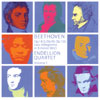Beethoven String Quartets Nos 2, 11 and 16
Keenly honed interpretations mark the Endellions’ return to recording
View record and artist detailsRecord and Artist Details
Composer or Director: Ludwig van Beethoven
Genre:
Chamber
Label: Warner Classics
Magazine Review Date: 1/2006
Media Format: CD or Download
Media Runtime: 74
Mastering:
Stereo
DDD
Catalogue Number: 2564 62161-2

Tracks:
| Composition | Artist Credit |
|---|---|
| String Quartet No. 2 |
Ludwig van Beethoven, Composer
Endellion Qt Ludwig van Beethoven, Composer |
| String Quartet No. 11, 'Serioso' |
Ludwig van Beethoven, Composer
Endellion Qt Ludwig van Beethoven, Composer |
| String Quartet No. 16 |
Ludwig van Beethoven, Composer
Endellion Qt Ludwig van Beethoven, Composer |
| Satz (Allegretto) |
Ludwig van Beethoven, Composer
Endellion Qt Ludwig van Beethoven, Composer |
Author: Nalen Anthoni
Three works, reflecting different stages in Beethoven’s artistic life, form the first in a projected series of the string quartets from the Endellion, marking an auspicious return to the recording studio. Tony Faulkner’s engineering handsomely honours their playing, as secure as their interpretative acumen is keenly honed. How so is heard in the slow movement of Op 135, Lento assai, cantante e tranquillo, to which Beethoven in one of his sketches added the words ‘Sweet song of rest or of peace’. And that is what we get, the call for profundity expressed through absolute control of tempo, tone, balance, phrasing and dynamics, the pathos of the coda particularly moving.
At the other extreme is the opening movement of Op 95 (Quartetto serioso is Beethoven’s title), an Allegro con brio of tightly packed invention where the Endellions’ pacing reflects both stony determination and the sardonic humour implicit in the mad modulations. Their view may lack the terse concision of the Takács or the concentrated drive of The Lindsays, yet it is just as trenchant and cohesive. So, too, is their performance of the Second Quartet as exemplified by the lyrically played slow movement, with its incisive yet nicely shaded fast section and chiselled Scherzo, the Trio a tad slower to emphasise its barer fabric.
A small point: pianissimi could be softer and mezza voce more of an undertone. But there is no questioning the assiduity of these musicians, even in the recently discovered 34-second B minor Allegretto. Welcome back.
At the other extreme is the opening movement of Op 95 (Quartetto serioso is Beethoven’s title), an Allegro con brio of tightly packed invention where the Endellions’ pacing reflects both stony determination and the sardonic humour implicit in the mad modulations. Their view may lack the terse concision of the Takács or the concentrated drive of The Lindsays, yet it is just as trenchant and cohesive. So, too, is their performance of the Second Quartet as exemplified by the lyrically played slow movement, with its incisive yet nicely shaded fast section and chiselled Scherzo, the Trio a tad slower to emphasise its barer fabric.
A small point: pianissimi could be softer and mezza voce more of an undertone. But there is no questioning the assiduity of these musicians, even in the recently discovered 34-second B minor Allegretto. Welcome back.
Discover the world's largest classical music catalogue with Presto Music.

Gramophone Digital Club
- Digital Edition
- Digital Archive
- Reviews Database
- Full website access
From £8.75 / month
Subscribe
Gramophone Full Club
- Print Edition
- Digital Edition
- Digital Archive
- Reviews Database
- Full website access
From £11.00 / month
Subscribe
If you are a library, university or other organisation that would be interested in an institutional subscription to Gramophone please click here for further information.




